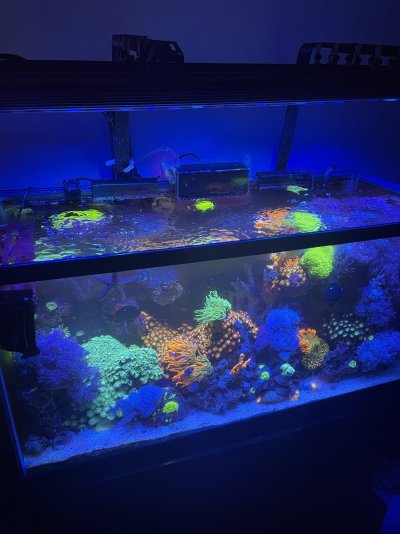- Joined
- Jun 9, 2020
- Messages
- 1,012
- Reaction score
- 788
In reef tanks specifically, I have made some observations related water changes. Firstly, I would think that we can all agree that with proper parameter maintenance our tanks can thrive. Some of the ways people achieve this is by dosing, water changes, skimming, media reactors, UV lighting, etc.
Secondly whenever we come upon an issue almost 99% of the time has to do with parameters. While coral structure health can be easily solved by dosing, lighting, proper flow etc. Every niche issue generally goes back to nutrients, be it bubble, film, hair algae, cyano, diatoms and even dinos. They are tied into either a nitrate, phosphate or silicate problem. Its key to understand why those issues come about and how to solve them. Often I hear reefers throwing a water change at any problem they face, especially when it comes to nutrients. I have come to the conclusion that water changes can often (not always) create more of a problem than already exists. Say you have A diatom or Dino outbreak, performing water changes adds silicates to the water column and thereby promotes their growth. While water changes may be a "quick fix" to create a cleaner system I believe that they may cause more issues.
So we go to solutions. How can we solve issues like thes. My simple answer is once again tank chemistry. Lets say you have higher nitrates, skip the water change and dose iron. Iron has been proven to accelerate the growth of corals. What happens when corals are growing faster than normal? They consume more nutrients... Faster. So now your nitrate issue is out the door. Have phosphate issues? Dose carbon or other credible phosphate removers. Parameters in check, no water changes
While Bob from Montana might have a lot about reefing right, this method of parameter management has been incredibly effective. I don't recommend this way for everyone... its difficult but incredibly rewarding as life tends to teach us.
I would appreciate your thoughts.
Nigel
Secondly whenever we come upon an issue almost 99% of the time has to do with parameters. While coral structure health can be easily solved by dosing, lighting, proper flow etc. Every niche issue generally goes back to nutrients, be it bubble, film, hair algae, cyano, diatoms and even dinos. They are tied into either a nitrate, phosphate or silicate problem. Its key to understand why those issues come about and how to solve them. Often I hear reefers throwing a water change at any problem they face, especially when it comes to nutrients. I have come to the conclusion that water changes can often (not always) create more of a problem than already exists. Say you have A diatom or Dino outbreak, performing water changes adds silicates to the water column and thereby promotes their growth. While water changes may be a "quick fix" to create a cleaner system I believe that they may cause more issues.
So we go to solutions. How can we solve issues like thes. My simple answer is once again tank chemistry. Lets say you have higher nitrates, skip the water change and dose iron. Iron has been proven to accelerate the growth of corals. What happens when corals are growing faster than normal? They consume more nutrients... Faster. So now your nitrate issue is out the door. Have phosphate issues? Dose carbon or other credible phosphate removers. Parameters in check, no water changes
While Bob from Montana might have a lot about reefing right, this method of parameter management has been incredibly effective. I don't recommend this way for everyone... its difficult but incredibly rewarding as life tends to teach us.
I would appreciate your thoughts.
Nigel




















